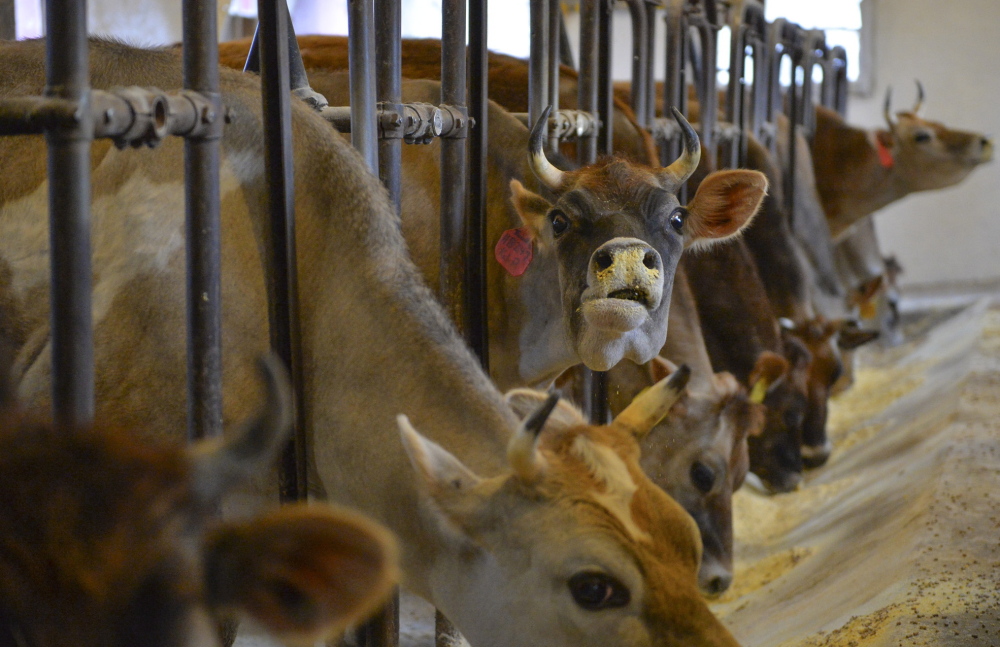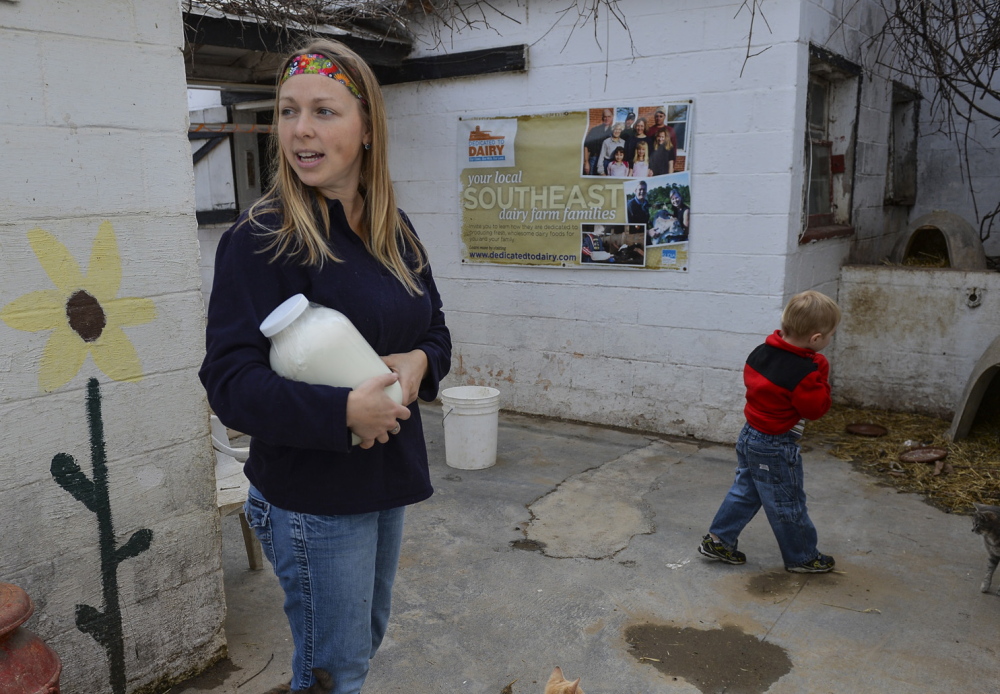WASHINGTON — An alliance of food activists and anti-regulation libertarians is battling to legalize raw, unpasteurized milk, despite warnings from health officials about the rising toll of illnesses affecting adults and children alike.
As the popularity of raw milk has grown, so too have associated outbreaks. They have nearly doubled over the past five years, with eight out of 10 cases occurring in states that have already legalized sales of the unpasteurized product, according to Centers for Disease Control and Prevention data. Public health officials have also documented how pathogens in raw milk have produced kidney failure in more than a dozen cases and paralysis in at least two.
But distrust of government and a thirst for the milk have helped fuel the movement to do away with federal and state restrictions despite the warnings. In states where raw milk remains banned, black and “gray” markets have emerged for enthusiasts seeking “moonshine milk” in the belief that bacteria-killing heat from pasteurization also kills powerful enzymes and eliminates other properties that can cure allergies, asthma, even autism.
LEGISLATION IN 23 STATES
During this legislative session, 40 bills have been introduced in 23 state capitals, all seeking to legalize unpasteurized milk within state borders.
And in Congress, Rep. Thomas Massie, R-Ky., who raises grass-fed cattle and says he grew up drinking unpasteurized milk, introduced two bills last week that would get the Food and Drug Administration out of the business of policing raw milk sales.
It is illegal for raw milk dairy farmers to sell and transport their product across state lines – a ban the FDA is charged with enforcing. But every day, thousands of gallon-sized glass jars, filled with the creamy white stuff, move from state to state, arriving at consumers’ front doors through co-ops, buyers clubs and from friends and relatives who sometimes pack it with dry ice and ship it via FedEx.
Consumers will pay as much as $12 a gallon for raw milk from cows and goats. And the CDC estimates that 1 to 3 percent of Americans are drinking it. Sometimes the only jars they can find are labeled “For Pet Consumption Only.”
“No one is feeding this to their pets,” said Massie, who calls his bills “Milk Freedom Legislation.” “They are buying raw milk for themselves and their families. And they are doing it because we have some very stupid laws out there.”
Fueling the movement is a Washington-based nonprofit, Weston A. Price Foundation, co-founded in 1999 by nutritionist Mary Enig and Maryland dairy farmer Sally Fallon Morell.
Its realmilk.com website directs members to write and call lawmakers in support of raw milk legislation, connects consumers with producers and targets the FDA’s “secret war” on unpasteurized milk. In 2007, the foundation’s firepower grew when it formed a separate nonprofit – the Virginia-based Farm-to-Consumer Legal Defense Fund.
“The government is not listening to what consumers are asking for,” said Fallon Morell, whose farm is in Maryland, where raw milk sales are banned. “People are sick and tired of industrialized food.”
Since their legislative campaign began nearly 15 years ago, seven states have passed laws or regulations allowing people to buy into cow- or herd-sharing programs to get raw milk. Another three states have started permitting raw milk for pet consumption. Arkansas has eased its ban on sales of raw milk and now allows purchases from farmers. Ten other states have eased restrictions that blocked dairy farmers from selling to retail establishments.
In 2010, the battle to legalize raw milk found its emotional rallying cry in the predawn raid of an Amish farm by FDA agents and armed U.S. marshals. For months, undercover FDA agents had made straw purchases of Daniel Allgyer’s unpasteurized milk, posing as new customers of his Pennsylvania-based buyers club – and documented deliveries across state lines to homes in Maryland and Washington.
Allgyer shuttered his farm in response to the FDA’s enforcement efforts and outraged members of Allgyer’s Grassfed On the Hill buyers club staged a protest on the National Mall, drinking raw milk within view of the nation’s Capitol. The leading libertarian in Congress, Rep. Ron Paul of Texas, took up their cause, blasting bans on raw milk sales as “pasteurization without representation.”
In statehouses across the nation, the Amish farmer’s tale – along with several arrests of raw-dairy farmers by state officials in several states – struck a chord among lawmakers as examples of government overkill.
Among the 40 state bills this year, several would allow cow- and herd-sharing programs that provide a way around laws that ban direct milk sales. With them, consumers are allowed to buy a share of a dairy cow with a dozen or more people. The milk they get from the cow is technically theirs, so it doesn’t legally constitute a milk purchase.
Kitty Hockman-Nicholas operates a cow-sharing program in Virginia, which has legalized them. Her Hedgebrook Farm tends to 10 jersey cows on behalf of their client-owners. “They’re paying me for that –not the milk,” the third-generation farmer said.
ENFORCEMENT DRIVEN BY COMPLAINTS
In states where raw milk sales remain illegal, agriculture officials said enforcement is largely driven by complaints, which triggers a warning letter that usually ends the practice. But activists say the movement has succeeded in forcing the government to back off.
FDA officials would not disclose enforcement figures or discuss their strategy.
Although raw milk advocates acknowledge some health concerns, they say it is one of the safest food products available.
Advocates insist the health benefits of “nature’s perfect food” are crucial to a healthy diet. They cite European studies that found children who are raised on farms and grow up drinking raw milk have fewer allergies and fewer cases of asthma than children who live in urban environments and drink pasteurized milk.
The CDC, which analyzed more than a decade of outbreak data, said the chance of getting sick as part of an outbreak caused by raw milk is 150 times greater than from pasteurized milk. The agency reported that 796 people in 24 states had become sick after consuming raw milk between 2006 and 2011, the latest years for which complete data is available.
CDC and FDA officials say 55 percent of the victims are younger than 18.
Send questions/comments to the editors.




Success. Please wait for the page to reload. If the page does not reload within 5 seconds, please refresh the page.
Enter your email and password to access comments.
Hi, to comment on stories you must . This profile is in addition to your subscription and website login.
Already have a commenting profile? .
Invalid username/password.
Please check your email to confirm and complete your registration.
Only subscribers are eligible to post comments. Please subscribe or login first for digital access. Here’s why.
Use the form below to reset your password. When you've submitted your account email, we will send an email with a reset code.